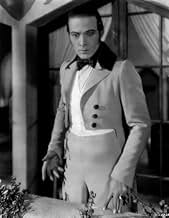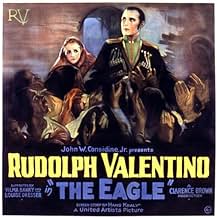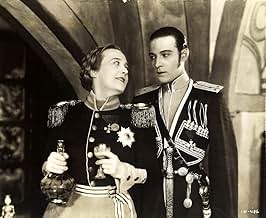IMDb रेटिंग
6.6/10
2.4 हज़ार
आपकी रेटिंग
अपनी भाषा में प्लॉट जोड़ेंA wanted Russian lieutenant becomes a masked vigilante seeking vengeance upon the man who stole his family's land, only to fall for his charming daughter.A wanted Russian lieutenant becomes a masked vigilante seeking vengeance upon the man who stole his family's land, only to fall for his charming daughter.A wanted Russian lieutenant becomes a masked vigilante seeking vengeance upon the man who stole his family's land, only to fall for his charming daughter.
- निर्देशक
- लेखक
- स्टार
- पुरस्कार
- कुल 2 जीत
Vilma Bánky
- Mascha Troekouroff
- (as Vilma Banky)
James A. Marcus
- Kyrilla Troekouroff
- (as James Marcus)
Spottiswoode Aitken
- Dubrovsky's Father
- (बिना क्रेडिट के)
Agostino Borgato
- Priest
- (बिना क्रेडिट के)
Mario Carillo
- Marcel Le Blanc - French Tutor
- (बिना क्रेडिट के)
Gary Cooper
- Masked Cossack
- (बिना क्रेडिट के)
Jean De Briac
- Minor Role
- (बिना क्रेडिट के)
Otto Hoffman
- Man Whose Purse is Stolen
- (बिना क्रेडिट के)
Eric Mayne
- Official Asking for Signature
- (बिना क्रेडिट के)
Russell Simpson
- The Eagle's Lieutenant
- (बिना क्रेडिट के)
- …
Mack Swain
- Innkeeper
- (बिना क्रेडिट के)
Gustav von Seyffertitz
- Court Servant at Dinner
- (बिना क्रेडिट के)
फ़ीचर्ड समीक्षाएं
When the horses of a coach with two ladies speed after a shot, the Czarina Catherine II (Louise Dresser) sees the young Lieutenant Vladimir Dubrovsky (Rudolph Valentino) rescuing the ladies. She invites Dubrovsky to have dinner with her, but he is sexually harassed by the czarina and flees from the palace. He receives a letter from his father telling that he had been evicted from his lands by the corrupt Kyrilla Troekouroff (James Marcus). Meanwhile the czarina issues an arrest warrant authorizing the arrest of Dubrovsky dead or alive. Dubrovsky heads to his home town, but his father dies and he promises revenge against Kyrilla. He wears a mask and is called "The Black Eagle", and leads a group of unsatisfied men to fight against Kyrilla, stealing from the riches to deliver to the poor. However, when he meets Kyrilla's daughter Miss Mascha Troekouroff (Vilma Banky), Dubrovsky falls in love with her. Dubrovsky needs to rethink and choose between "eye for an eye and tooth for a tooth" and his love for Mascha.
"The Eagle" is a melodramatic and romantic silent movie with a hero that is a combination of Zorro and Robin Hood. The plot is entertaining and well constructed but it is funny to see, for example, Dubrovsky forgetting his friends and his promise to kill the man that stole the lands of his father that died after just because he is in love with Kyrilla's daughter. My vote is seven.
Title (Brazil): "O Águia" ("The Eagle")
Note: On 23 May 2024, I saw this film again.
"The Eagle" is a melodramatic and romantic silent movie with a hero that is a combination of Zorro and Robin Hood. The plot is entertaining and well constructed but it is funny to see, for example, Dubrovsky forgetting his friends and his promise to kill the man that stole the lands of his father that died after just because he is in love with Kyrilla's daughter. My vote is seven.
Title (Brazil): "O Águia" ("The Eagle")
Note: On 23 May 2024, I saw this film again.
I saw "The Eagle" made in 1925 a few years back on video from Nostalgia cable. It had a sound effects addition and a beautiful Tchaikovsky orchestral score by Michael Hoffman. Mr. Valentino played the first of his duel role career as a fearless lieutenant in the imperial Czarina home guard. When Valentino learns of his father's swindle by a crooked neighbor and lawyer, he rushes home to find his father dying and estate forfeitured. He seeks revenge as THE BLACK Eagle, sort of Robin Hood. The crooked neighbor has a lovely daughter who comes between Valentino carrying out his intentions. Will THE BLACK EAGLE EXTRACT his due? The ending straightens out any ill intentions.
Charles Farenga
Charles Farenga
I seldom see this title mentioned on lists of great silent films, and perhaps it doesn't belong in the same heady company with the works of Murnau and Eisenstein, but surely The Eagle belongs on anyone's list of the most entertaining movies made during the silent era. It is first-rate escapism, a real "movie-movie" that can hold its own with the best swashbuckling sagas of Douglas Fairbanks and Errol Flynn, and that counts for a lot in my book. It's also one of the best movies in which Rudolph Valentino appeared (along with his next film, The Son of the Sheik, which unfortunately proved to be his last), or in any case it's one that holds up well for modern viewers, offering just the right blend of action, suspense, comedy, and romance, all presented at a brisk tempo. Valentino rapidly improved as an actor during his brief career, so in these final appearances there is no trace of the nostril-flaring histrionics on display in some of his early performances. At the pinnacle of his career as a movie star, Valentino is at the top of his game in this action hero role, charismatic and self-assured, but displaying just a touch of self-mockery to keep things in perspective.
Rudy plays a Cossack officer, Lieutenant Dubrovsky, stationed in the court of Catherine the Great. (The Czarina is played by Louise Dresser in a brief but memorable turn.) Dubrovsky catches the Czarina's eye when he manages to regain control of a runaway carriage just outside the palace gates, and in this way he also meets a beautiful young lady named Mascha (Vilma Banky), with whom he becomes involved. The plot kicks into gear when Dubrovsky rejects the Czarina's advances; soon afterward, he assumes the persona of the Black Eagle, an outlaw devoted to avenging his father, whose lands have been appropriated by an evil count named Kyrilla -- who just happens to be Mascha's father. Valentino's character in this film is often described as a "Russian Robin Hood," but the parallel with Zorro is stronger, especially when he manages to operate under the very nose of his arch enemy in the guise of a foppish French tutor, Monsieur Le Blanc. Much of the film's humor comes from these scenes, but when the time comes for action The Black Eagle is all business, and Valentino proves himself as dashing and gallant as Douglas Fairbanks while cutting a more romantic figure.
The Eagle points up the importance of silence in Valentino's career, for while he was said to have a pleasant voice it might have been difficult to accept him as a Russian officer in a talkie; let's face it, Rodolfo Alfonzo Raffaele Pierre Filibert Guglielmi di Valentino d'Antonguolla would have a hard time persuading anyone of his Russian heritage if we could hear him speak. Leading lady Vilma Banky, who was as beautiful as Rudy was handsome, spoke limited English with such a thick Hungarian accent that talkies ended her American film career, so this movie could not have worked so well with the same cast as a talkie, even if Valentino had survived into the 1930s. And besides, the highly stylized 19th century "Russia" of this film is very much a Hollywood fantasy concoction anyhow, the sort of thing that worked best in silent cinema. One of my favorite aspects of The Eagle is the elaborate Art Deco design scheme by William Cameron Menzies, which at times almost suggests the world of Dr. Seuss (a bit of an exaggeration, perhaps, but not by much). Combine Menzies' sets with the stylish cinematography of George Barnes, spice the mix with George Marion Jr.'s witty title cards, top it off with the slyly tongue-in-cheek performances, and you have all the ingredients for a cinematic feast.
In sum, I feel it's the comic elements of The Eagle that make it such a fun film, the sense that the filmmakers are discreetly giving us a little wink to let us know they're well aware this is all cotton candy. Speaking of comedy, the cast features a couple of Keystone veterans in supporting roles: Mack Swain, who was so memorable as the delusional prospector in Chaplin's The Gold Rush, has a brief uncredited bit as an inn-keeper who misunderstands Monsieur Le Blanc's needs; and veteran character actor George Nichols, who plays the corrupt judge, directed a few of Chaplin's earliest comedies, including The Star Boarder and Cruel, Cruel Love. Maybe it's the Keystone pedigree that boosts the comedy content here, but whatever the case this film stands as a highly enjoyable example of what Hollywood craftsmen were capable of when the silent cinema was at its peak.
Rudy plays a Cossack officer, Lieutenant Dubrovsky, stationed in the court of Catherine the Great. (The Czarina is played by Louise Dresser in a brief but memorable turn.) Dubrovsky catches the Czarina's eye when he manages to regain control of a runaway carriage just outside the palace gates, and in this way he also meets a beautiful young lady named Mascha (Vilma Banky), with whom he becomes involved. The plot kicks into gear when Dubrovsky rejects the Czarina's advances; soon afterward, he assumes the persona of the Black Eagle, an outlaw devoted to avenging his father, whose lands have been appropriated by an evil count named Kyrilla -- who just happens to be Mascha's father. Valentino's character in this film is often described as a "Russian Robin Hood," but the parallel with Zorro is stronger, especially when he manages to operate under the very nose of his arch enemy in the guise of a foppish French tutor, Monsieur Le Blanc. Much of the film's humor comes from these scenes, but when the time comes for action The Black Eagle is all business, and Valentino proves himself as dashing and gallant as Douglas Fairbanks while cutting a more romantic figure.
The Eagle points up the importance of silence in Valentino's career, for while he was said to have a pleasant voice it might have been difficult to accept him as a Russian officer in a talkie; let's face it, Rodolfo Alfonzo Raffaele Pierre Filibert Guglielmi di Valentino d'Antonguolla would have a hard time persuading anyone of his Russian heritage if we could hear him speak. Leading lady Vilma Banky, who was as beautiful as Rudy was handsome, spoke limited English with such a thick Hungarian accent that talkies ended her American film career, so this movie could not have worked so well with the same cast as a talkie, even if Valentino had survived into the 1930s. And besides, the highly stylized 19th century "Russia" of this film is very much a Hollywood fantasy concoction anyhow, the sort of thing that worked best in silent cinema. One of my favorite aspects of The Eagle is the elaborate Art Deco design scheme by William Cameron Menzies, which at times almost suggests the world of Dr. Seuss (a bit of an exaggeration, perhaps, but not by much). Combine Menzies' sets with the stylish cinematography of George Barnes, spice the mix with George Marion Jr.'s witty title cards, top it off with the slyly tongue-in-cheek performances, and you have all the ingredients for a cinematic feast.
In sum, I feel it's the comic elements of The Eagle that make it such a fun film, the sense that the filmmakers are discreetly giving us a little wink to let us know they're well aware this is all cotton candy. Speaking of comedy, the cast features a couple of Keystone veterans in supporting roles: Mack Swain, who was so memorable as the delusional prospector in Chaplin's The Gold Rush, has a brief uncredited bit as an inn-keeper who misunderstands Monsieur Le Blanc's needs; and veteran character actor George Nichols, who plays the corrupt judge, directed a few of Chaplin's earliest comedies, including The Star Boarder and Cruel, Cruel Love. Maybe it's the Keystone pedigree that boosts the comedy content here, but whatever the case this film stands as a highly enjoyable example of what Hollywood craftsmen were capable of when the silent cinema was at its peak.
This was the first silent film I'd ever seen, and it immediately captivated me. All the acting is incredible, and Valentino's allure is breathtaking. The story is adventurous and interesting and even humorous at times. I recommend it to anyone interested in seeing a silent film or anyone just looking to see some classic entertainment.
Enjoyable adaptation of Russian novel for American screen with well-polished Rudolf Valentino as the former Czarist officer who extracts revenge as the "Black Eagle" against the landowner who cheated his father. Valentino performs macho acts and is not cast only as a ladies man. Excellent directing by Clarence Brown, good re-writing to fit an American audience, some tricky camera shots, and wonderful sets add to the enjoyment of this very good film. Vilma Banky sizzles as the beautiful romantic interest that makes the erstwhile thief select love over vengeance. This is the next to the last time that we see Valentino. Gary Cooper (uncredited) appears as one of the masked cossacks -- you will never find him. Recommended.
क्या आपको पता है
- ट्रिविया'Rudolph Valentino' wanted to project a more aggressively masculine image in this film, so in order to establish this with the cast and crew, he sent home stunt double Nicky Caruso and did the spectacular opening stunt - leaping onto a horse and chasing down a runaway carriage - himself.
- गूफ़The story is set during the reign of Catherine the Great, who died in 1796, but the clothing styles are much closer to those worn in the early 19th century. And at one point Vladimir lights a candle with a friction match, which weren't invented until 1826.
- भाव
Vladimir Dubrovsky: Haven't we met before?
Mascha Troekouroff: I think not. I don't associate with masked men as a rule.
- इसके अलावा अन्य वर्जनKilliam Shows, Inc. copyrighted a restored, tinted and scored version in 1971, currently available on video with running time of 72 minutes. The restoration was done by Karl Malkames and the theater organ score was by Lee Irwin.
- कनेक्शनFeatured in The Beverly Hillbillies: Jed Rescues Pearl (1963)
टॉप पसंद
रेटिंग देने के लिए साइन-इन करें और वैयक्तिकृत सुझावों के लिए वॉचलिस्ट करें
- How long is The Eagle?Alexa द्वारा संचालित
विवरण
बॉक्स ऑफ़िस
- US और कनाडा में सकल
- $3,23,150
- चलने की अवधि
- 1 घं 13 मि(73 min)
- ध्वनि मिश्रण
- पक्ष अनुपात
- 1.33 : 1
इस पेज में योगदान दें
किसी बदलाव का सुझाव दें या अनुपलब्ध कॉन्टेंट जोड़ें












































